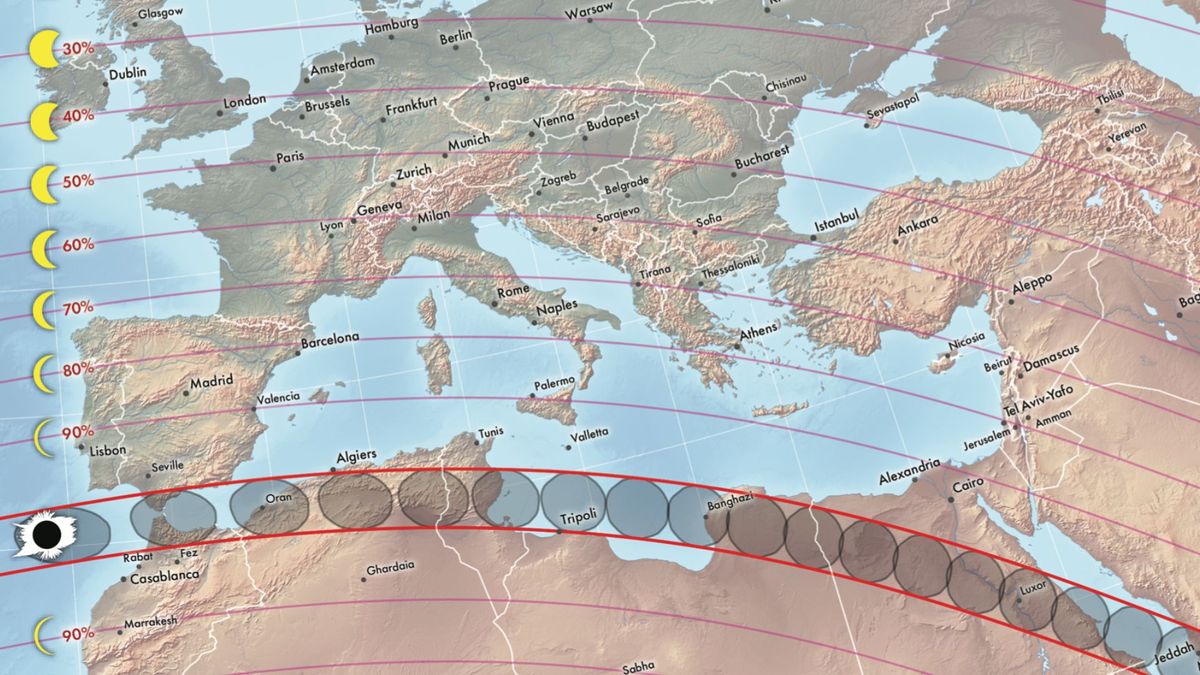Are you preparing for the “eclipse of the century”? Once word gets out about the landmark total solar eclipse on Aug. 2, 2027, you can bet that thousands of eclipse chasers will plan a trip to the path of totality.
Perhaps the biggest draw of this landmark solar eclipse is the length of totality, which will reach 6 minutes, 23 seconds. The potential viewing locations will attract many onlookers, with ancient Egyptian temples and Roman ruins within the path of totality. And who can overlook the excellent weather prospects? Whereas clouds can often block eclipses, that’s unlikely to happen on Aug. 2, 2027, because from some locations, there’s a nearly zero chance of clouds.
Related: Where will the 2027 total solar eclipse on Aug. 2 be visible?
The prize is darkness in the day and a chance to see the sun’s corona with your naked eyes — but only if you’re in the right place at the right time.
The 160-mile-wide (258 kilometers) path of totality will cross Spain, Morocco, Algeria, Tunisia, Libya, Egypt, Sudan, Saudi Arabia, Yemen, Somaliland, Somalia and the Chagos Islands, throwing almost 89 million people under the moon’s umbral shadow.
Here are 10 top tips for planning your total solar eclipse experience.
1. Expect high temperatures
This will be a very, very hot experience. As the moon’s shadow sweeps across the land, temperatures will cool dramatically. Such will be the searing heat across the path of totality from southern Spain to Arabia, and the chilly temperatures during totality will likely be one of the main features of this eclipse. However, bank on coping with temperatures of around 106 degrees Fahrenheit (41 degrees Celsius). It’s no wonder that almost all tour groups planning to visit Luxor, Egypt, will observe the eclipse from the grounds of five-star hotels with air-conditioning.
2. Know the weather odds
It’s extremely rare for a path of totality to cross regions of the planet where clouds are almost impossible. Yet that’s exactly what will happen on Aug. 2, 2027. If you want a cloud-free experience, head to anywhere in inland Egypt (including the Siwa Oasis, Luxor and anywhere else on the Nile within the path), or board a cruise ship that’s planning to observe in the Mediterranean off the coast of Libya.
However, the entire path of totality will not be cloud-free. The Atlantic Ocean will likely have clouds — ruling out a stress-free cruise from the Azores or Madeira, Portugal — as could the Strait of Gibraltar and northern Morocco.
3. Consider Egypt
Egypt is set to be the marquee location for this eclipse, and many North American eclipse chasers may not consider traveling there. Yes, Egypt is far, and it’s in an unpredictable region. However, tourism is a thriving industry in Egypt, with nearly 12 million visitors in 2022 and an estimated 15 million in 2024.
Most visits are trouble-free. However, it’s important to note that Americans might want to be cautious, as the U.S. State Department sometimes advises against travel to Egypt. Whether you choose to travel independently or opt for an organized tour, there are many opportunities to have an enjoyable visit to Egypt.
4. Don’t forget Spain
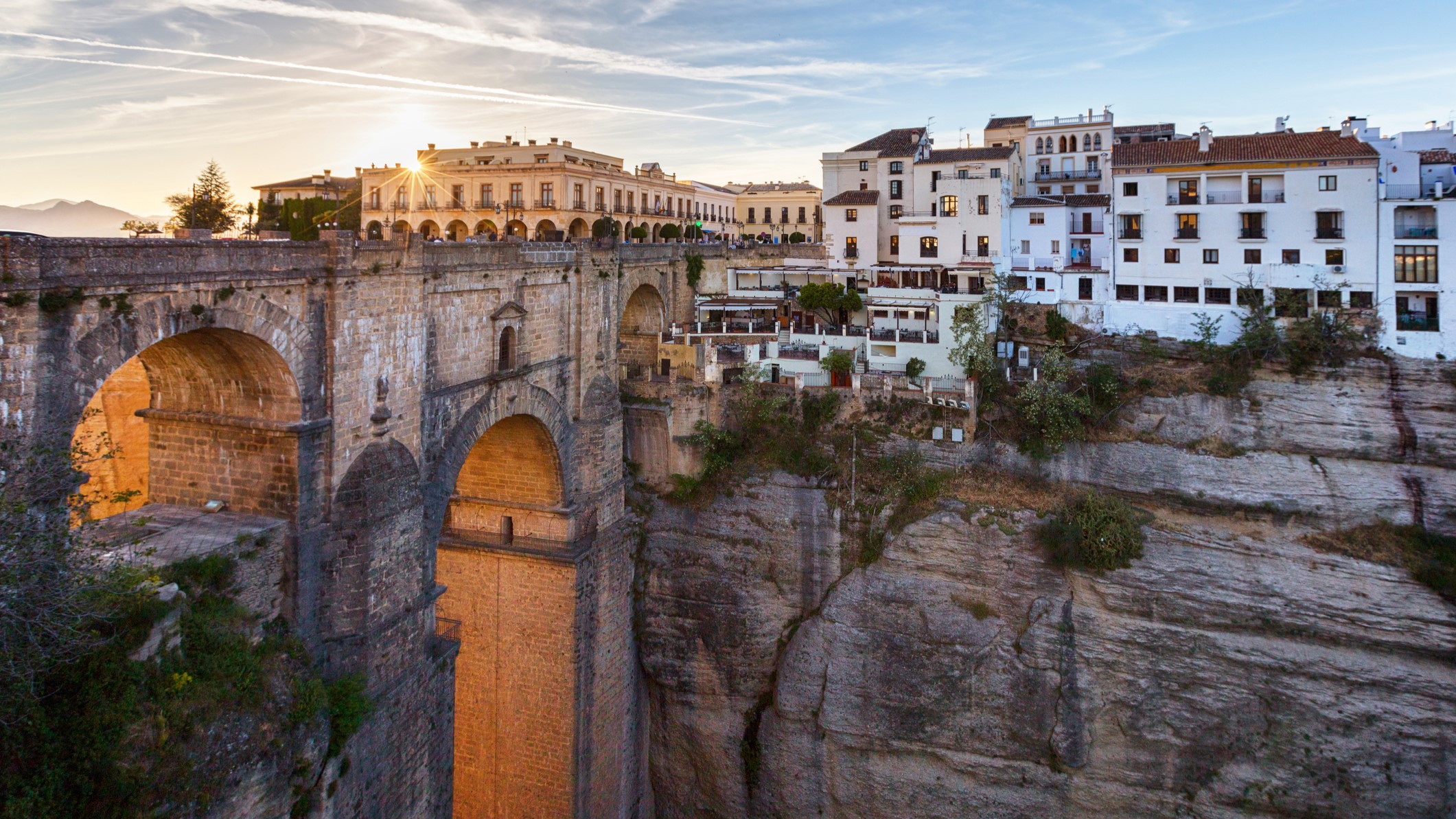
Spain will experience two total solar eclipses within a single lunar year, with totality in its North on Aug. 12, 2026, and across the southern region of Andalusia on Aug. 2, 2027. The second of these two eclipses will have the longest totality and the highest chance of clear skies. Spain is north of the centerline for this eclipse, but longer totalities will occur the farther south in the country you travel. Note these durations of totality:
- Cádiz (2 minutes, 46 seconds)
- Málaga (1 minute, 56 seconds)
- Ronda (1 minute, 17 seconds)
- Marbella (3 minutes, 17 seconds)
- Parque Natural Los Alcornocales (3 minutes, 50 seconds)
- Algeciras (4 minutes, 26 seconds)
- Torre de Guadalmesí (4 minutes, 38 seconds)
- Baelo Claudia (4 minutes, 31 seconds)
- Tarifa (4 minutes, 39 seconds)
5. Have a Tatooine totality
In addition to crossing the Western Desert in Egypt, the path of totality will travel across the Tunisian desert, home to a few “Star Wars” film sets. Close to Tozeur, Tunisia, are the sets for Mos Espa (2 minutes, 4 seconds) and “Star Wars Canyon”; 3 minutes, 9 seconds) at Sidi Bouhlel. Lars Homestead from the original “Star Wars” movie is just south of the path.
6. See the Milky Way
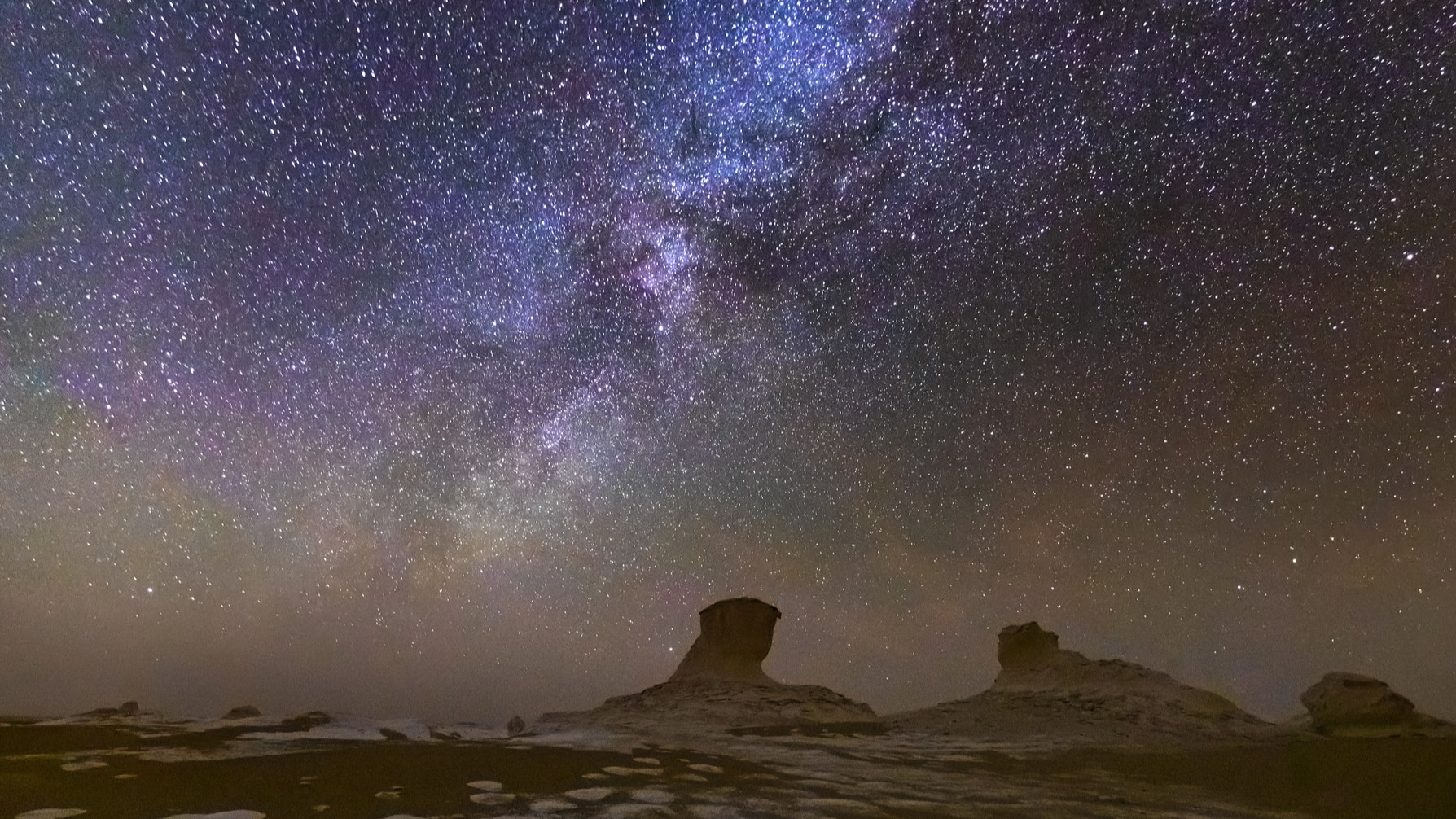
Solar eclipses are the perfect travel event for anyone who loves stargazing and astronomy. By definition, solar eclipses occur during the new moon, when the night skies are moonlight-free. If you put yourself in the cloud-free Western Desert in Egypt, you will be afforded fabulous views of the Milky Way on the nights before and after the Aug. 2 eclipse.
7. Hang around for the Perseids
As a bonus, the Perseid meteor shower will run from July 17 to Aug. 24, 2027. It will peak on the night of Aug. 12 and the morning of Aug. 13 during a waxing gibbous moon. However, because the shower’s “shooting stars” are so bright, it might be worth staying in desert regions for another 10 days post-eclipse. Wadi Rum in Jordan, a relatively easy trip from North Africa, is popular for stargazing in dark skies.
8. Watch out for clouds in Gibraltar
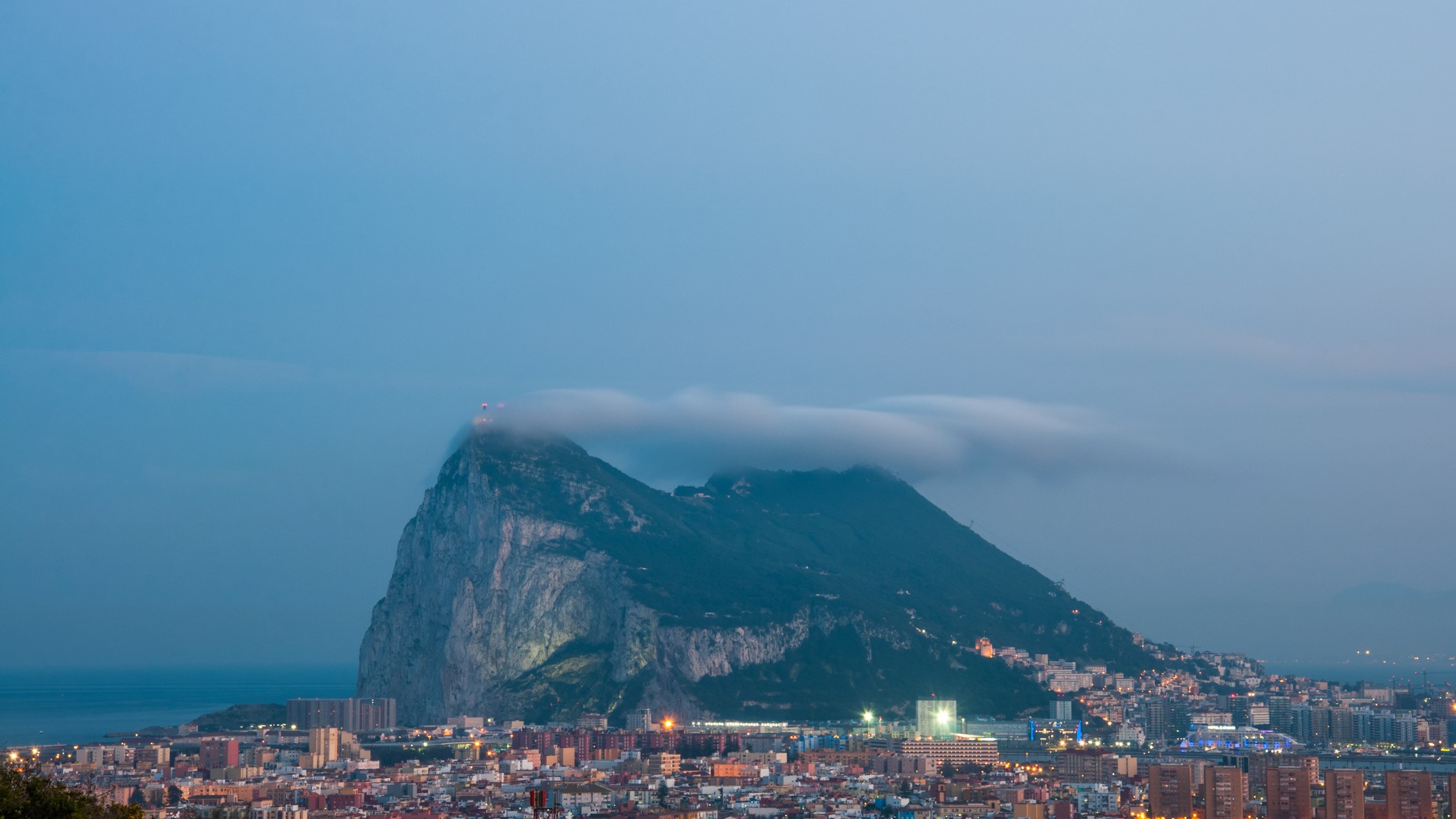
The British Overseas Territory of Gibraltar, a short flight from the U.K., will appeal to many. It’s dominated by the Rock of Gibraltar, a 1,398-foot-high (426 meters) limestone ridge that seems, in theory, to be a fabulous place to witness totality. It even has observation decks (and Barbary macaques). However, “The Rock” also generates its own clouds and rain. The “Levanter” can appear anytime and brings distinctly un-summery weather.
9. Prepare your camera
This will be a very popular eclipse to photograph. With so much time in totality in many locations, few people will be able to resist the urge to capture an eclipsed sun. Many more plan to spend a few minutes photographing the eclipse and enjoying it with their naked eyes.
However, there are some things to think about and precautions to take. This will be a very high eclipse, so expect to lie on the ground if you want to take a close-up with a telephoto lens. (From Luxor, the eclipse will occur at 82 degrees, which is almost directly above.)
Remember your solar viewing kit including solar filters designed to make your camera safe for observing the sun.
Related: How to observe the sun safely (and what to look for)
Keep your camera in the shade until totality, and place it in a camera bag when you’re moving between extreme heat and an air-conditioned hotel room, which can cause condensation on the lens. Use a weather-sealed cover to keep out dust and sand. For more tips, see our guides on how to photograph a solar eclipse and how to photograph an eclipse with a smartphone.
10. Don’t ignore the Nile
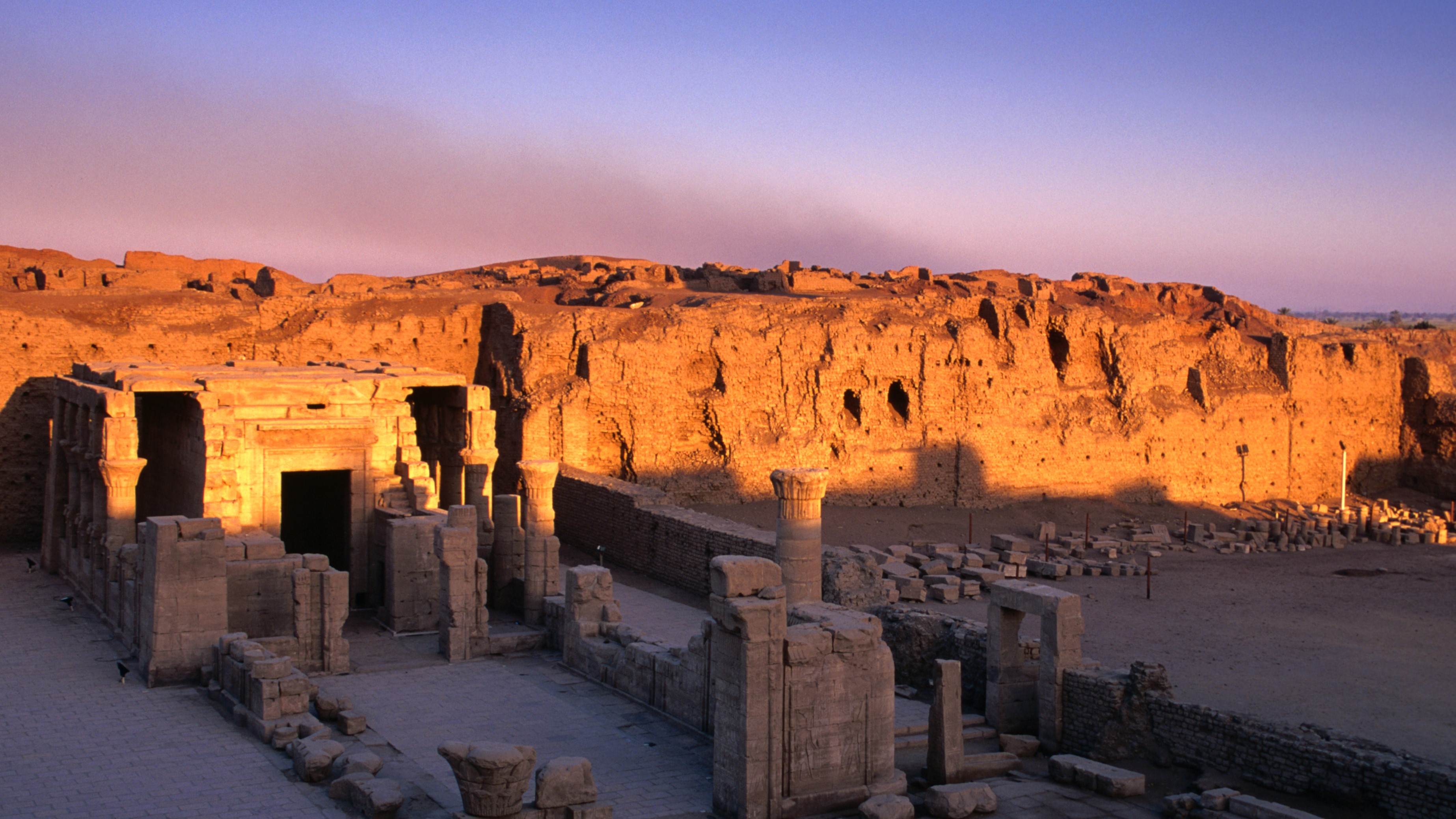
Many dedicated eclipse chasers will head to Luxor, Egypt, via a Nile cruise or to stay in a hotel. After all, that is where the maximum length of totality is, and clear skies are all but guaranteed. It’s a no-brainer. Or is it? Other locations are also appealing and may be less crowded.
For example, the temples at Edfu and Kom Ombowill experience over five minutes of totality. Both are a short drive from Aswan, a beautiful destination just beyond the southern limit of the path of totality.

Dr. Thomas Hughes is a UK-based scientist and science communicator who makes complex topics accessible to readers. His articles explore breakthroughs in various scientific disciplines, from space exploration to cutting-edge research.

